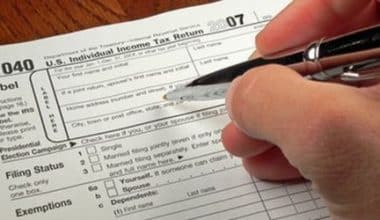Tax deductions can mean something quite different for self-employed people. Taxes may appear to be a form of retribution for the independence that comes with working for yourself. You must pay self-employment taxes in addition to conventional income taxes, which cover the portion that your employer would ordinarily pay directly. This increases your financial burden of paying taxes significantly, making self-employed tax deductions even more crucial. We will examine IRS Self Employed Deductions and Self Employed Health Insurance Premium in this post.
Fortunately, government lawmakers have put forth several self-employed tax deductions over the years that can lessen the blow. When it comes time to file your return, there are many expenses you may be allowed to deduct, including those related to your computer, gas bills, and even retirement savings. These are some of the most popular IRS deductions for self-employed.
Self-Employed Deductions
How can I lower my self-employment taxes? is probably the top concern for anyone self-employed, whether as a freelancer or independent contractor. Most independent contractors want to claim every tax break available to them to lower their taxes, but they may not be aware of all of their options. Here are the IRS self-employed tax deductions that you shouldn’t forgo as of 2023, whether you operate at a loss or a profit.
#1. Credit Card Interest
You can deduct credit card interest on your federal tax return if you used your credit card for business expenses. Purchases that are “ordinary and necessary” for the running of the business are those that the IRS deems to be qualifying business expenses. They could be things like your phone, internet, food, pay stubs, rent, utilities, and interest.
#2. Home Office Deduction
By the comprehensive tax reform, President Donald Trump signed into law in 2017, you are now not permitted to deduct expenses for a home office if you work for a firm. However, even if you’re a renter, you might still be eligible if you’re self-employed and use a portion of your house for business purposes.
The standard procedure and the simplified approach are the two ways to claim during tax season. Whichever approach you go with, your home office needs to fulfill two conditions.
The office must first be used regularly and exclusively for commercial activities, as required by the IRS.
Next, it should serve as your primary place of business, which implies that you hold meetings and do business there. Therefore, your home office may not be eligible for the deduction if you regularly hold meetings elsewhere.
#3. Training and Education Expenses
You might be able to claim a deduction on your tax return if you paid for work-related education costs throughout the year. Your compensation must go toward education that upholds or enhances your expertise in your current field of employment. However, it might not be regarded as deductible if the education makes you eligible for a new position or line of work.
Health insurance can be expensive if you work for yourself, but you can write it off on your taxes. Amounts include the premiums you paid for health insurance for you, your spouse, any dependents, and any children under the age of 27 who are covered by your health plan, regardless of whether you deducted them on your tax return.
For this deduction to apply, a net profit must be reported. If you didn’t, Schedule A of your federal tax return on Form 1040 can be used to claim your premiums as an itemized deduction.
#5. Business Mileage
You can write off your miles on your tax return if you use your automobile for work, whether you’re making deliveries or just traveling to meetings. You can only deduct business mileage if you drive for both personal and commercial purposes.
Also, you have two choices when it comes to deducting mileage from your taxes, just like with the home office deduction.
You can multiply the regular mileage rate by the number of business miles you traveled over the year. Through June 30, 2022, the standard mileage rate is 58.5 cents per mile. From July 1, 2022, through the end of the year, you can claim 62.5 cents per mile for business travel.
#6. Phone Services
You may deduct the cost of your business’s cell phone expenses. If your annual cellphone bill is $2,000 and you use 30% of it for work, you would be able to deduct $600 from your taxes. To ascertain your business usage, you want to select a record-keeping system.
#7. Qualified Business Income Deduction
Some small business owners can exclude up to 20% of their business income from federal taxes thanks to the qualified business income deduction. Owners of businesses may be eligible for this deduction from 2017 until 2025. If you operate as a sole proprietor, an S-corporation, or a partnership, you may write off this sum. To be eligible, you don’t have to itemize your deductions.
You can deduct the cost of your business insurance premiums if you run a small business. In general, you can only deduct what applies to that particular tax year. For instance, you can only deduct $5,000 for the year paid if you pay $10,000 on January 1, 2023, for a two-year business insurance policy. The remaining $5,000 must be written off the next year.
#9. Travel Deductions
When you travel for work, you can write off your travel costs. The deduction, however, cannot be exorbitant or wasteful nor may it be utilized for private purposes. Airline tickets, taxi or ride-sharing fees, hotel and housing costs, luggage fees, and dry cleaning costs are a few examples of travel expenses.
The IRS self-employed deductions take into account business travel that necessitates spending more time away from home than a workday and necessitates rest while gone.
#10. Self-Employment Tax Deduction
The IRS deducts 15.3% of self-employment tax from self-employed individuals’ net earnings. Your net earnings are calculated by deducting your business expenses from the revenue generated by your business. 12.4% for Social Security and 2.9% for Medicare make up the rate.
#11. Advertising Deduction
In general, you can write off the costs you incurred for business advertising. One example of deductible advertising expenses is the price of maintaining your brand’s visibility in the public. TV, radio, social media marketing fees, commercials, and direct mail are a few examples of advertising costs.
#12. Rent Deduction
Rent paid for the use of property that you do not own may be written off as a business cost. If you own a portion of a building, you cannot deduct whatever rent you have paid. Rent is often only deductible in the year it was paid or incurred. Let’s assume that you made a three-year advance rent payment of $36,000.
In general, you might deduct only $12,000 for rent in 2023. The remaining sums are deductible for $12,000 each in the ensuing years. To make sure you file this claim correctly, you should educate yourself about the IRS’s additional regulations for rent deductions.
#13. Startup Expenses
In general, you have up to 15 years to write off your initial costs for a business. However, startup and organizational expenses for businesses paid after October 22, 2004, are immediately deductible up to a maximum of $5,000.
Startup costs include expenses related to starting, buying, or researching a business. The expenses involved in forming a company or a partnership are considered organizational charges. Examples include the costs incurred when hiring a lawyer to help you incorporate your business.
#14. Club and Membership Dues
In general, you cannot deduct club and membership dues that you paid for social, recreational, or business purposes. The following organization’s dues, however, are deductible as long as they aren’t used only to host events for members and visitors.
#15. Retirement Savings
Contributions to eligible plans, like 401(k) plans and SEP IRAs, are tax deductible. Amounts may include the contributions you make for your retirement or those of an employee. Depending on the type of plan you have, there are different limits on how much you can deduct for contributions to eligible plans.
To establish your deductible amount, you should consult with a tax expert.
Comparing self-employed individuals to those who are considered employees, self-employment has a variety of tax implications. The deductions you can make represent one significant difference. For instance, independent contractors and other self-employed people can deduct the health insurance premiums they pay thanks to the self-employed health insurance premium deductions.
You don’t want to overlook this deduction while filing your taxes. Self-employed individuals are permitted to deduct up to 100% of their yearly health insurance premiums. You must fulfill certain requirements to claim the deduction.
If you have acceptable insurance and qualify as a self-employed person, then the answer is that they are deductible. Medical insurance, qualifying long-term care coverage, and all Medicare premiums (Parts A, B, C, and D) are all included in the qualifying self-employed health insurance premium deductions.
If you have a net profit listed on Schedule C or F, your health insurance premiums are tax deductible. You may also qualify if you hold a general partnership position, get guaranteed payments from a limited partnership, or own more than 2% of the outstanding stock of an S corporation and receive Form W-2-reported compensation.
Whose coverage is permissible to deduct from your self-employed health insurance? All premiums paid for you, your spouse, your dependents, and any non-dependent children who will be under 27 at the end of the year may be included.
You won’t be qualified for this deduction if you have access to an employer-sponsored, subsidized health plan. In this scenario, the employer may be a coworker of yours or your spouse. Your health insurance premiums are not tax deductible if the plan is sponsored by either of your employers.
The self-employed health insurance deduction can be claimed on Schedule 1 of Form 1040 as an adjustment to gross income. Whether you decide to itemize your deductions or take the standard deduction, you are still eligible to claim this deduction.
What is a 20 Self-employment Deduction?
The deduction enables qualified taxpayers to write off up to 20% of their QBI as well as 20% of qualified dividends from publicly traded partnerships (PTPs) and real estate investment trusts (REITs).
What are Examples of Self-employed Taxpayers?
As a lone entrepreneur or independent contractor, you operate a business or trade. You are a partner in a partnership that runs a business or commerce. In every other case, you work for yourself (including as a gig worker or part-time business owner).
Does Self-employed Pay Income Tax?
Self-employed people typically have to pay both income tax and self-employment (SE) tax. A Social Security and Medicare tax known as the SE tax is mostly applied to people who work for themselves.
Why Do Self-employed Pay More Taxes?
Self-employed individuals are subject to the same federal income tax obligations as other taxpayers. Their lack of an employer to share the cost of paying Social Security and Medicare taxes as well as the ability to have money withheld from their paychecks and sent to the IRS makes a difference.
What is Self-employed with Example?
Self-employed people may engage in a range of professions, but they typically have a high level of expertise in one particular field. A self-employed individual can be a writer, a tradesperson, a freelancer, a trader or investor, a lawyer, a salesperson, or an insurance agent.
Who are the Self-employed People?
In general, if any of the following apply to you, you are self-employed. As a lone entrepreneur or independent contractor, you operate a business or trade.
What is the 50% Deduction for Self-employment Tax?
You can deduct 50% of your self-employment tax from your taxable income. For instance, a $1,000 payment of self-employment taxes lowers taxable income by $500. You avoid paying $125 in income taxes if you’re in the 25 percent tax bracket.
What is the Maximum Self-employment Contribution?
Elective deferrals up to the annual contribution cap and 100% of pay (or “earned income” in the case of a self-employed person) If you are above 50, you will receive $30,000 in 2023 ($27,000 in 2022; $26,000 in 2020 and 2021), or $22,500 in 2023 ($20,500 in 2022; $19,500 in 2020 and 2021).
How Much Self-employment is Taxable?
15.3%. The self-employment tax rate is 2021% of net earnings, as previously mentioned. This rate is made up of a 2.9% Medicare tax and a 12.4% Social Security tax on net income.
Conclusion
These are just a few of the most typical IRS tax deductions that self-employed individuals may be eligible to use. More deductions might be made clear by a tax expert. They might also assist you in figuring out which deductions are applicable in your particular situation. But be sure to take advantage of the IRS tax breaks for the self-employed that are listed in this article.
Related Articles
- SELF-EMPLOYED TAX: Rate, How To Calculate It & Deduction
- What Is Self-Employment Tax, and How Do You Calculate It?
- HOW TO PAY TAXES: What You Should Know & Guide
- CONTRACT WORK: Meaning, Examples, Taxes & How It Works
- How To File Sole Proprietorship Taxes: Detailed Guide






